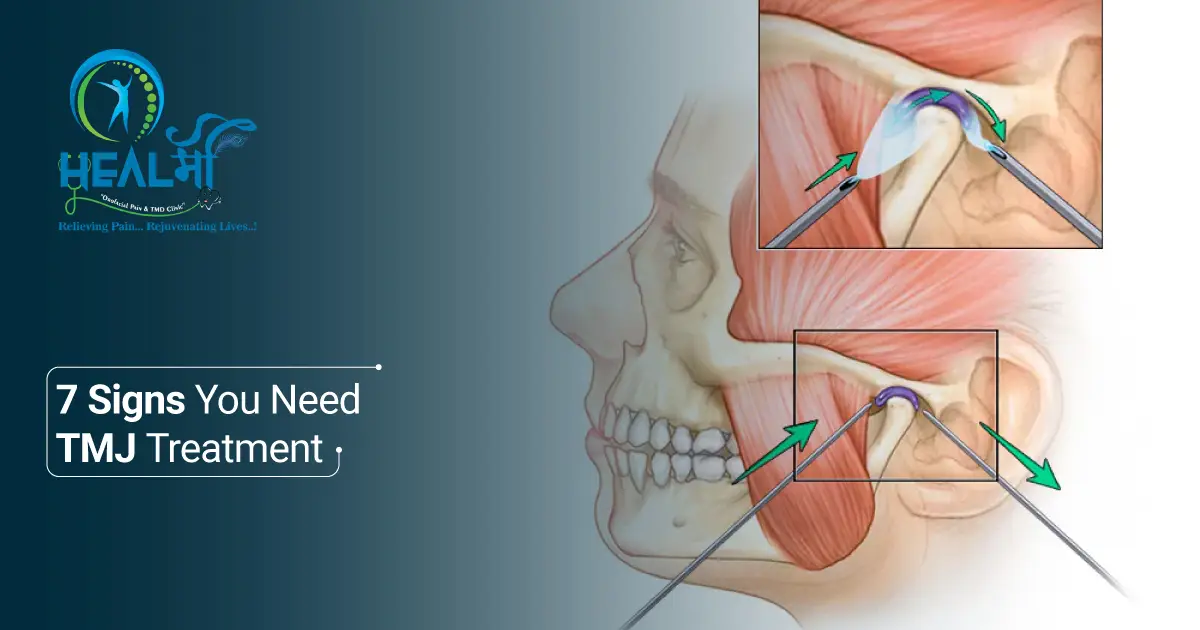Signs You Need TMJ Treatment
Home
Signs You Need TMJ Treatment

Home
Signs You Need TMJ Treatment


If you've been feeling jaw pain, headaches, or other odd symptoms, it's time to think about TMJ disorder treatment. Is TMJ a new word for you? TMJ refers to the Temporomandibular Joint- which is the joint that connects the jaw bone to the skull.
In cases where you have symptoms related to your jaw joint, TMJ Disorder comes into play! And spotting TMJ disorder signs early is key. Early treatment can ease symptoms and stop the condition from getting worse.
A blog by experts from the HealMe Orofacial Pain and TMD Clinic, the TMJ Specialist in Ahmedabad, has covered common signs and symptoms of TMJ disorders. If you know these, you can prevent any issues to your overall health.
TMJ disorders affect the jaw joint and can cause many symptoms. Your daily life gets disturbed when you have any TMJ Disorder. The reasons for TMJ disorders are not fully known but they can be linked to temporomandibular joint dysfunction, jaw joint problems, and other TMJ causes.
Having a TMJ disorder makes simple tasks hard. Eating, speaking, and yawning can be tough. The pain and discomfort can mess up your sleep and focus. It can also hurt your social and work life. If not treated, TMJ disorders can really lower your quality of life.
But before it affects you, how to know the Signs You Need TMJ Treatment? Read further and prevent any of the symptoms from affecting you.
It's important to spot the early signs of TMJ disorders early. Watch out for these common TMJ disorder symptoms :
If you notice any of these TMJ warning signs, it's time to see a TMJ Specialist. They may suggest Exercises for TMJ Relief and even treatments. The sooner you get help, the better your chances of finding a good treatment and relief from these symptoms.
Alternative Therapies : Certain techniques like massage or meditation can also provide relief for some migraine sufferers. 10 Common TMJ Pain Relief Exercises You Should Know will help you understand the route to faster recovery.
If you're feeling jaw stiffness, TMJ pain, or facial muscle discomfort, it might mean you have a TMJ disorder. These symptoms are often worse in the morning or when you're chewing. You better not let them trouble you.
As the day goes on, TMJ pain can get worse, especially when eating. Chewing can hurt, making you avoid certain foods or skip meals.
TMJ disorders can also cause facial muscle discomfort- one of the important Signs You Need TMJ Treatment. You might feel tightness in your temples, cheeks, or neck and be tired.
If you're dealing with ongoing headaches or facial pain, TMJ Disorders might be the cause.
TMJ disorders can cause tension headaches, migraines, and sinus headaches.
Ear pain is a common TMJ disorder sign. The severity of this pain can fluctuate- it can feel dull, sharp, or throbbing. It often starts in the jaw and moves to the ears.
Tinnitus, or a ringing sound in the ears, can also be a TMJ problem sign. As this TMJ joint is linked to the inner ear through muscles and ligaments, if the TMJ displaces, it can irritate these structures and cause tinnitus.
Looking at the severity and duration of your symptoms is key. If your jaw, face, or neck hurts a lot, or if it's hard to eat, speak, or sleep, you should see a doctor because you will get to know if these are the Signs You Need TMJ Treatment. Also, if you have headaches, earaches, or muscle tension, take help.
There can be times you may feel unsure if you need a doctor, then make a wise decision and make an appointment.
Getting a proper TMJ diagnosis is the first step to feeling better. HealMe Orofacial Pain Specialists in Ahmedabad are here to help you find out what's causing your TMJ disorder and provide the best TMJ Treatment so you can start to feel better and live a better life.